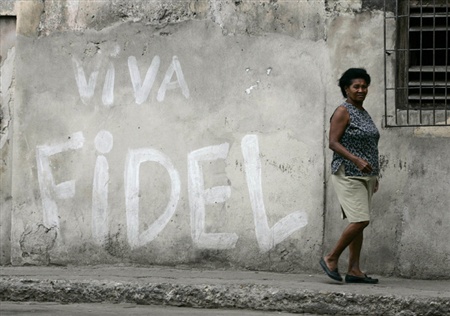The Cuban street scene is very different to what I am used to in England. The fact that England has snow and ice, whilst Santiago has afternoon temperatures of up to 29C in January, accounts for some of that difference. However, the way of life is very different too.
Various people make their living on the street and announce their arrival audibly. There are four different types of bread delivery men, who announce their arrival with either a whistle or a call, known as a pregon, therefore the callers are known as pregoneros. The first type pushes a trolley, whose metal wheels make a loud noise on the concrete streets. He delivers people’s daily ration of one bread roll per person at the price of 0.05 CUP (1 CUP = £0.015), if they wish, for which they pay him a monthly fee of 3 CUP.
The next bread man pushing a trolley is selling loaves of bread on behalf of the bakery. This bread is known as especial. It costs 3.50 CUP at the bakery, but he charges 3.70, and announces his arrival with a cry of “especial, tres setenta!”. Later in the day, a self-employed man comes by, selling the same bread for 5 CUP per loaf.
The final bread delivery man is selling the same bread rolls that cost 0.05 CUP on the ration card for 0.50 CUP, ten times as much, but still less than a British penny. His pregon is “buen pan! buen pan!” (good bread, good bread).
Maniseros come past selling peanuts in paper cones, known as cucuruchus. These cost 1 CUP each. Two brothers pass each afternoon, calling “Di tu!” (speak) in a high-pitched tone, like a bird. In the evening, another passes with his peanuts in a metal can, which has hot coals underneath, to keep them warm. He announces his arrival by banging the can with a stick.
Carratilleros (wheelbarrow men), some with a horse and cart, come past, selling fruit and vegetables. Various pregoneros pass by, selling cakes, ice cream or tamales.
Another carratillero passes, calling his offer to buy bottles for 1 CUP each, to take for recycling. Others offer their services as knife sharpeners or cooking pan cleaners.
The dustmen come three times per week to collect the rubbish, announcing their arrival by ringing a bell.
At street corners, or outside of houses, people are selling small piles of fruit or vegetables, shoes, plumbing supplies, eggs and other goods.
Due to a low level of traffic, children play on the street until late in the evening. Youths play football or baseball and men set up tables under street lights to play dominoes. Neighbours chat outside of their houses. Many houses have loud music coming from the open doors and windows. When the popular soap operas (known here as telenovelas) are on television, the same dialogue can be heard from almost every house.
In addition to the human sights and sounds mentioned above, dogs prowl the streets, barking, and cockerels can be heard crowing from early in the morning.
All in all, there is rarely a dull moment on the streets which, for a foreigner like myself, provide endless interest and entertainment.

Ah yes the telenovellas- these can be heard even in the smallest villages, when every window and door reverberate with the sonorous voices of the actors, and every cubano is glued to the telly…. but remember, the news is first, THEN the telenovella, so people are informed and then entertained…..
Thank you for this totally vivid description of normal life in Cuban neighbourhood. Easy to miss all of the noises of life as it is, that are not at all normal in our part of the world… but for us Cuba-lovers the noice has become an essential part of how to live…